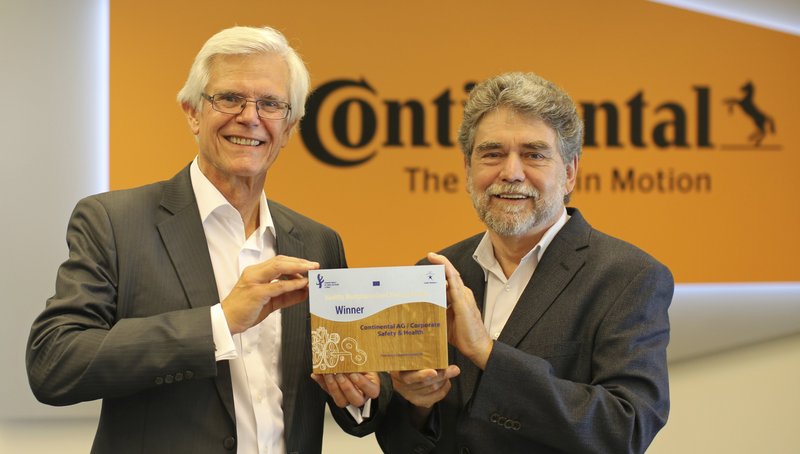Continental Wins EU Award for Its Innovative Ergonomics and Demographics Program
- Technology company receives Best Practice Award from European Agency for Safety and Health at Work (EU-OSHA)
- Workplace design protects both young and old employees from excessive stresses and strain
- Prevention instead of rehabilitation: Continental has been improving working conditions continually for over a decade
Hanover, July 12, 2017. Technology company Continental has won the European Agency for Safety and Health at Work’s (EU-OSHA) Best Practice Award. As part of the “Healthy workplaces for all ages” campaign, the EU umbrella organization recognized Continental for its group-wide ergonomics and demographics program. The Continental program supports the aim of enabling flexible and ideal deployment of workers, irrespective of their age, gender or personal performance capacity.
Continental not only creates health-conscious working conditions for older staff and those with reduced performance capacity, but, with its program, raises awareness of what younger employees need. In this way, the company avoids subjecting its staff to excessive stresses and strain. And this approach impressed the European jury.
“Through this program, we support our staff in providing them with a healthy working environment which also helps to protect their own health. Our policy here means we create new jobs which, from the outset, meet age stability criteria and which are not gender specific. And it is also important that young staff are not overburdened at work,” said Klaus-Dieter Wendt, Head of Ergonomics. All this highlights a Continental policy that targets prevention rather than rehabilitation.
Continental has in fact been working on making workplace stress levels measurable for the past 13 years – with much success. “The basic idea was to first detail the age-related performance impairments of staff, and to map these using software,” explains Wendt.
“Now we’ve expanded the concept to include the preventative approach aimed at protecting young staff. This enables us to actually avoid a situation where we subject our staff, whatever their age, to excessive stress – both physical and mental,” said Wendt. “We presented these two aspects as key indicators which Management uses to steer implementation within the company.”
In the ergonomics and demographics program, Continental uses an Exposure Documentation System that both identifies and quantifies types of workplace stress. The data then produces specific information on the levels of stress and strain that staff are exposed to at their workplace. This enables suitable work and workstations to be determined that would be suitable for staff with any health impairment. Additionally, any necessary reconfiguration or reorganization measures are indicated. It’s all about finding the “best fit” between staff member and company.
One key structural element in the program is the inclusion of interdisciplinary ergonomics training at the sites. Worldwide, team members undergo systematic ergonomic training. The program has already been carried out at all German sites, and is being successfully rolled out around the world.
“This initiative sees us forging ahead with our strategic goal of being the most attractive employer for our current and also future staff. The most important consideration is everybody’s health. Which is why Continental is giving it the priority it deserves,” confirms Dr. Peter Dolfen, Head of Corporate Safety & Health.
Particularly in the context of Industry 4.0 and digitalization, ergonomics and demographics are becoming increasingly important. “The transformation of work processes and activities is leading to people being exposed to new strains and stresses. Work is shifting more towards psychological/mental and detailed manual tasks. But these tasks are not reducing in number. We already have this within our sights,” said Wendt.



